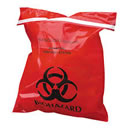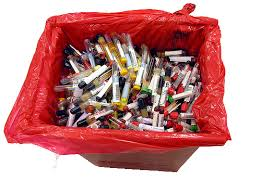Waste Management
IN SOUTH DAKOTA
Managing Medical Waste

South Dakota's solid waste administrative rules require that medical/infectious waste be rendered non-infectious prior to disposal in a municipal solid waste landfill.
Medical/Infectious Waste Defined
It is first important to understand what constitutes regulated medical/infectious waste. The Administrative Rules of South Dakota (ARSD) Section 74:27:07:01 adopt a medical/infectious waste definition found in the Code of Federal Regulations (40 CFR Part 60.51c). This lengthy definition broadly means any waste generated in the diagnosis, treatment, or immunization of human beings or animals, including related research, and production or testing of biologicals. Regulated medical/infectious waste is most commonly generated in hospitals, clinics, dentist offices, and veterinary facilities. It is important to recognize that the definition does not include certain hazardous wastes and medical-related wastes that are generated in our homes or a residential setting.
Treatment/Disinfection Required
The solid waste administrative rules (ARSD 74:27:13:17) require that medical/infectious waste must be rendered non-infectious by incineration, steam sterilization, chemical disinfectant, or equally effective treatment method, prior to disposal in a municipal solid waste landfill. A map of South Dakota landfills permitted to accept treated medical waste can be viewed on our Permitted Municipal Solid Waste Landfills webpage.
Household-Generated Medical Waste

A common medical waste generated in our homes is sharps (syringes) used for self-medication. Medical waste generated in our homes is exempt from the requirements stated above.
Even though exempted from regulations, citizens generating medical waste in a residential setting are encouraged to choose a disposal option that minimizes risk to sanitation workers, commercial waste haulers and landfill operators. Sometimes local medical facilities or retail businesses will accept sharps from the public for proper disposal. There are also many mail-back or takeback options available through national companies or programs. The Environmental Protection Agency offers good information on their Disposal of Medical Sharps webpage.
Please visit our Sharps Disposal Options in South Dakota flyer for more information about sharps disposal in South Dakota.
If you are unable to use one of the disposal options described above, please consider the following practice which could be used to safely dispose of sharps with your normal household garbage. Sharps (syringes) should be soaked in a bleach solution prior to placing the sharps in a puncture-resistant container with a sturdy cap. Once the bleach-soaked sharps are safely contained in a puncture-resistant container, the container can be legally disposed with your household garbage. This method of disinfection and disposal is only allowed in a household setting.
Pharmaceutical Waste
For helpful websites and information about managing pharmaceutical wastes, please visit our Managing Hazardous Pharmaceutical Waste webpage.
Recycling Warning
Never place medical waste, especially sharps, in any kind of recycling container. This results in unnecessary exposure to recycling workers and the contamination of other recyclable materials.
If you have any questions pertaining to disposal of medical waste, please contact the Waste Management Program by e-mail or by calling (605) 773-3153.